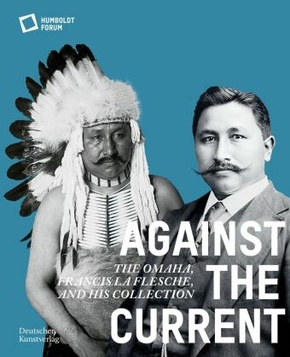
Against the Current - The Omaha. Francis La Flesche and His Collection
| Verlag | Deutscher Kunstverlag |
| Auflage | 2023 |
| Seiten | 128 |
| Format | 26,5 cm |
| Großformatiges Paperback. Klappenbroschur | |
| Gewicht | 473 g |
| Artikeltyp | Englisches Buch |
| ISBN-10 | 3422990763 |
| EAN | 9783422990760 |
| Bestell-Nr | 42299076A |
Francis La Flesche (1857-1932) lebte zwischen zwei Welten: Als Umonhon (Omaha) kämpfte er für deren Rechte, als Wissenschaftler erforschte er seine eigene Kultur. Er gilt als erster indigener Ethnologe Nordamerikas und steht stellvertretend für die vielen indigenen Akteur/-innen, ohne die ethnologische Sammlungen niemals entstanden wären. Die meisten dieser Personen sind uns nicht mehr bekannt, denn im Zentrum stehen bis heute die europäischen und nordamerikanischen Sammler/-innen. Francis La Flesche bildet eine Ausnahme: Seine Arbeit gibt einen Einblick in indigene Handlungsmacht und deren Widerstand gegen Rassismus und Kolonialismus sowie die aktive Teilhabe am Handel mit Objekten. Das Buch präsentiert zum ersten Mal La Flesches Aufzeichnungen über die Gegenstände, die er der 1894 ins heutige Ethnologische Museum nach Berlin gesandten Sammlung beigab - ein beeindruckendes Zeugnis seiner erfolgreichen Bemühungen, die Kultur der Omaha für künftige Generationen zu bewahren.
Francis La Flesche (1857-1932) lived between two worlds: as an Umo ho (Omaha), he fought for their rights, and as a scholar he researched his own culture. He is regarded as the first indigenous ethnologist of North America and stands representatively for the many indigenous protagonists without whom ethnological collections would never have come into being. We are no longer familiar with most of these individuals, since the focus until today has been on European and North American collectors. Francis La Flesche is an exception: his work provides insights into indigenous agency and their resistance to racism and colonialism as well as their active participation in the trade with objects. The book presents La Flesche's records of the objects, the collection of which he contributed to what is today the Ethnological Museum in Berlin in 1894-an impressive testimony to his successful efforts to preserve the culture of the Omaha for future generations.
